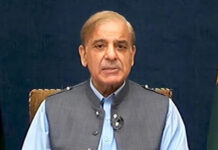KARACH: PPP MNA Shahida Rahmani, while speaking to a seminar organized by All Sindh Ladies Health Workers and Employees Union, in collaboration with the Public Services International (PSI) and Workers Education and Research Organisation (WERO), at Karachi Press Club, demanded that the sacrifices of frontline health workers who give their lives in the line of duty should be recognized at all level. Whether working during COVID-19 pandemic or as polio workers these lady health workers face immense challenges, while undertaking their duties, not only in the field but also at home front where they are subjected to domestic violence and harassment.
She vowed to highlight the charter of demands presented by the Lady Health workers union at national and provincial assemblies, raise these issues in the assembly sessions and will strive to solve these issues at the earliest.
The charter of demand is jointly presented by lady health workers of Pakistan India and Nepal. While the situation in Pakistan is relatively better where their union has been registered and they are given their basic wages and facilities, community health workers in Nepal and India are still struggling for their rights.
Chairperson Sindh Commission on the Status of Women (SCSW), Nuzhat Shirin while endorsing the demands presented by the lady health workers, said this is high time that the services of these workers are recognized at national level. She also highlighted the need for safety at work and proper provision of safety equipment to these health workers who go in the field as frontline soldiers and provide the much needed help to people.
“They are the important segment of the public health system, especially in rural areas, which are denied basic health facilities. These women fill that gap there. If not protected then they will not become vulnerable themselves but will be a risk for the community they are working in,” she maintained.
Prominent labour leader Zahra Khan said human history is a witness that the big revolutions in the world became successful only due to the inclusion of women in them.
Journalist Moniza Inam declared the charter of demand as a great milestone in their struggle which started in 2011 for attaining basic rights and will continue till their all demands are accepted by the government.
“During pandemic, health workers are facing immense problems where they are asked to monitor Covid situation in their areas of work, where they go without proper safety equipment. They should be provide proper safety equipment and facilities so that they could do justice to their responsibilities.”
President Karachi Union of Journalists Hasan Abbas while endorsing his support for the campaign of Lady Health workers, spoke on the central role played by women in making a strong society.
Dr Tauseef Ahmed Khan while quoting world renowned philosopher, cognitive scientist and historian Noam Chomsky, who said “Pakistan is going away from science,” termed his statement carrying deep meaning for women of Pakistan, who are not given the their rightful place in the society.
Central President of All Sindh Ladies Health Workers and Employees Union Haleema Zulqarnain spoke on the importance of declaring lady health workers as public health workers and their work should be recognized as public service, having same facilities and wages as is given to other public servants.
Mir Zulfiqar Ali Executive Director WERO, read out the charter of demands presented by lady health workers which included their recognition as public health workers; inclusion in decision-making processes, provision of occupational safety and health protection, dignity at work, care for the workers, and establishment of a people-centred healthcare system.
General Secretary of the Union Shama Gulani while thanking the audience in the end said that at the moment there are around 22000 LHWs in Sindh while the province needs at least 80,000 LHWs. She said that initially one LHW was supposed to cover a population of one thousand people only, which has now expanded not only in number but also in geographical coverage and they don’t get any additional allowance, food, care or transport to reach their place of work.





